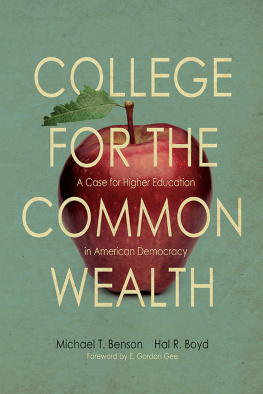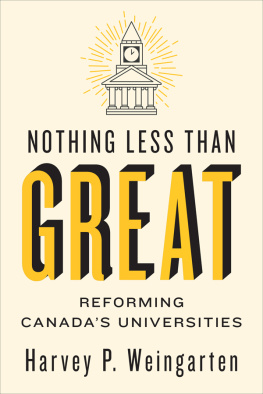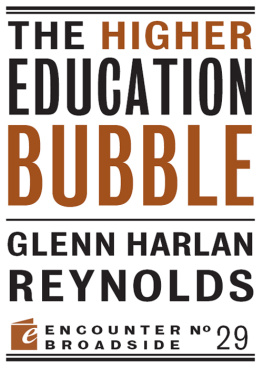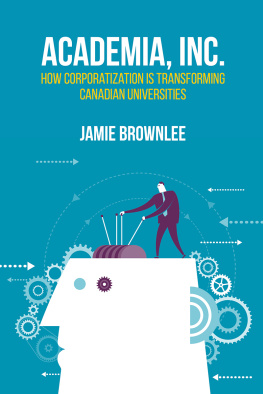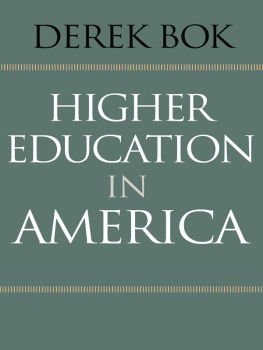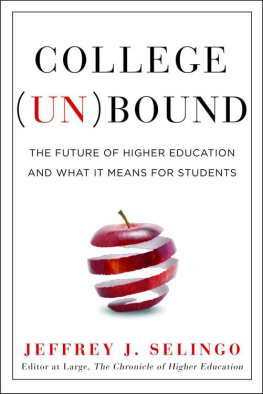The Great Mistake
C RITICAL U NIVERSITY S TUDIES
The Great Mistake
How We Wrecked Public Universities and How We Can Fix Them
Christopher Newfield
JOHNS HOPKINS UNIVERSITY PRESS BALTIMORE
2016 Christopher Newfield
All rights reserved. Published 2016
Printed in the United States of America on acid-free paper
9 8 7 6 5 4 3 2 1
Johns Hopkins University Press
2715 North Charles Street
Baltimore, Maryland 21218-4363
www.press.jhu.edu
Library of Congress Cataloging-in-Publication Data
Names: Newfield, Christopher, author.
Title: The great mistake : how we wrecked public universities and how we can fix them / Christopher Newfield.
Description: Baltimore : Johns Hopkins University Press, [2016] | Series: Critical university studies | Includes bibliographical references and index.
Identifiers: LCCN 2016012781| ISBN 9781421421629 (hardcover : alk. paper) | ISBN 9781421421636 (electronic) | ISBN 1421421623 (hardcover : alk. paper) | ISBN 1421421631 (electronic)
Subjects: LCSH: Public universities and collegesUnited StatesFinance. | Education, HigherAims and objectivesUnited States. | Higher education and stateUnited States. | Privatization in educationUnited States.
Classification: LCC LB2342 .N49 2016 | DDC 378/.05dc23 LC record available at https://lccn.loc.gov/2016012781
A catalog record for this book is available from the British Library.
Special discounts are available for bulk purchases of this book. For more information, please contact Special Sales at 410-516-6936 or specialsales@press.jhu.edu.
Johns Hopkins University Press uses environmentally friendly book materials, including recycled text paper that is composed of at least 30 percent post-consumer waste, whenever possible.
What do you do when you know that you know
That you know that youre wrong?
Sun Ra, Face the Music
Contents
Acknowledgments
Its been wonderful to have written so much of this book on the academic road, and to have written it in part because of the people Ive met during a long series of speaking invitations about the universitys fate. Among the most valuable of these visits have been those with groups working on the university with at least one foot outside of it, often without official status. I owe particular thanks to: Edu-Factory for bringing me to Universit La Sapienza in Rome; Sauvons la Recherche for their invitation to Toulouse; lInstitut Mditerranen de Recherches Avances in Marseille; Projet Foreduc at the Universit de Paris X-Nanterre; the Society for the Study of New and Emerging Technologies participants in Darmstadt in 2010; the Los Angeles MLA counter-conference in 2011; HUMLab at the University of Ume, Sweden; the EPOKE seminar at Aarhus Universitys Danish School of Education; the Social Science Centre in Lincoln, United Kingdom; the organizers of the MLA Subconferences 20142016; and the Vampire Slayers Project at San Francisco State.
In 2011, a fellowship at the University of Cambridges Centre for Research in the Arts, Social Sciences, and Humanities (CRASSH) allowed me to start thinking about how my work on various topics might turn into a book. Many thanks to the members of our research group on the future university, CRASSH director Mary Jacobus, Ellie Shermer for punting and talking, and especially to Susan Larsen for company and theater and for getting me there in the first place. That term I first met Stefan Collini, Joel Isaac, and Paul Ryan, who have continued to help my thinking about the higher ed environment.
A series of lectures that led to particularly enjoyable and illuminating conversations were set up, in chronological order, by Bob Frodeman, Les Back, Priscilla Wald, Asli Tekinay, Eva Hartmann, Carolyn De La Pea, Bruce Burgett, Lauren Goodlad, Robert Knapp, Marcia Kay Klotz, Henry Giroux, Pat Morton, Jim Lee, Scott See, Meredith McGill, Peggy Kamuf, David Theo Goldberg, Doug Morgan, Winfried Fluck, Sieglinde Linde, Patrik Svensson, Sabine Sielke, Catherine Cole, Ron Strickland, Ann Bermingham, Daniel Mitchell, Ann Cvetkovich, Jonathan Elmer, Sarah Blackwood, Greg Niemeyer, and Jenna Ng. The book took its final cyclical form through discussions that took place after my lecture at the Consortium of Humanities Centers and Institutes Annual Meeting in April 2013 at the University of Kansas, and I am grateful to Victor Bailey for both the invitation and extraordinary hosting. From there another round began, thanks to Shuchi Kapila, Sue Wright, Brenna Bhandar, Nora Hanson, Helen Small, Constance Penley, Jenna Joo, Laura Pulido, Matthew Wickham, Sarah Misemer, Sara Guyer, Richard Grusin, Teresa Mangum, Matthew Santos, Robert Watson, Anne Barron, Amanda Anderson, Colleen Lye, Howard Brody, Judy Taylor, Laura Goldblatt, Cris Shore, Daniel HoSang, Will Callison, Martina Kohl, Elisabeth Schfer-Wnsche, Antnio Magalhes, Fiona Hollands, Mike Neery, Lisa Hajjar, Davina Cooper, Jo Williams, Matthew Sparke, Eric Sandeen, Margie Ferguson, Crystal Bartolovich, Timothy Melley, Angela Segler, and Scott Thomas. These generous individuals and their astute colleagues were my teachers and continuously renewed my education on the state of universities across North America and Europe.
In California, I was regularly inspired by a UC faculty-staff-student-activist-analyst crew that included Amanda Armstrong, Michael Buroway, Julie Carlson, Aranye Fradenburg, Peter Krapp, Celeste Langan, Catherine Liu, Bob Samuels, James Vernon, the UCSB Faculty Association Executive Board, and particularly Wendy Brown and Colleen Lye. Im sorry I cant thank the UC staff members who, worried about employer retaliation, wrote to me about internal affairs on condition of anonymity. Bloggers have had to fill a news void between airbrushed official communications and a downsized independent press; many thanks on this count to Dan Mitchell at the UCLA Faculty Association blog, Bob Samuels again, the folks at Reclaim UC, the mysterious Cloudminder in California, and to Nick Fleischer, Richard Grusin, Chuck Rybak, and Sara Goldrick-Rab in Wisconsin. Ongoing thanks to Stanton A. Glantz, the unshakable advocate for the public status of the University of California, for his example.
While I was writing the book, three research groups offered intellectual and moral support. One was the Online Study Group I formed at UC Santa Barbara to investigate the Age of the MOOC that was decreed across the land: thanks to David Theo Goldberg, director of the UC Humanities Research Institute, for funding it, and to researchers Xiao Hu, Giselle Jaude, and especially the die-hards Jenna Joo, Cameron Sublett, and Alexandra Splan. After the MLA Subconference in early 2014, I fell in with a group of wonderful graduate students and younger faculty to work on designing an alternative university. The reason, as one put it, is, we want a precarity we chose and not a precarity handed down to us by our declining institutions. The Autonomous U group assured me that better educational systems still lie over the horizon and that they will draw on the idealism that attracts people to higher education. Thanks to all participants and particularly to core animators Laura Goldblatt, Nora Hanson, and Thea Sicar.
Finally, as I was writing the first draft of this book in late 2013, the European Union Marie Curie Initial Training Network, called Universities in the Knowledge Economy (UNIKE), invited me to give a talk at their first meeting in Copenhagen. Intellectually, I never left. UNIKE formed a continent-wide higher education research consortium with graduate fellows from every part of Europe and representation from East and Southeast Asia. Among the many contributions of its encompassing sociointellectuality to my thinking has been a clear sense of the government-corporate-NGO postsecondary educational ecosystem of which the university is only one part. If any group has helped suspend my churchy centrism toward the university as the unique site of advanced learning it has been UNIKE, through its multicentered collaborative interactions rooted in a series of weeklong workshops at a range of sites, even as its reigning ethos has been the renewal of the public university as a free social force. I am reluctant to single out individuals in this distributed group effort, but am particularly grateful to: UNIKEs faculty partners at Bristol, Roehampton, Ljubljana, and Porto; the Auckland, Copenhagen, and Porto site teams; the Theme 6 crew that first formed as the angry group; the Nyhavn last-drink crowd who refused to help me write these acknowledgments; Chris Muellerleile; and especially Susan Wright, UNIKEs PI who put it together and kept it going while conducting inspiring research. My summary of the UNIKE effect is sanity and enlightenment. The effect continues.
Next page



